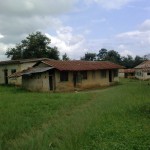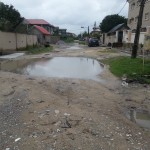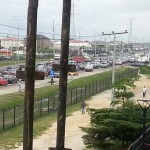Yorùbá jẹ́ ẹ̀yà ti ó wà ni Ìwọ̀-õrùn orilẹ̀ èdè Nigeria. Bi Yorùbá ti fẹ́ràn igbádùn tó, bẹ ni wọn fẹ́ràn òwò ṣiṣe àti ẹ̀kọ́ kikọ́. Ọba, Olóyè, Ọlọ́rọ̀ àti aláìní ilẹ̀ Yorùbá ló fẹ́ràn àti rán ọmọ wọn lọ si ilé-iwé bi àwọn fúnra wọn kò ti ẹ lọ si ilé-iwé. Eleyi jẹ ki Yorùbá pọ kà kiri àgbáyé pàtàki ni Àríwá/Òkè-ọya Nigeria.
Nibi ti ọ̀pọ̀lọpọ̀ Yorùbá ti fẹ́ràn “iwé-kikà” ni ẹ̀yà miràn ti fi ẹsin bojú lati ṣe àtakò iwé kikà, pàtàki àwọn ti o ni “A ò fẹ́ iwé – Boko Haram”. Àwọn ti ó ni àwọn kò fẹ́ lọ si ilé-iwé bẹ̀rẹ̀ si pa ọmọ àwọn ti ó fẹ́ lọ. Wọn kò dúró lóri ọmọ ilé-iwé nikan, wọn ńpa enia bi ẹni pa ẹran ni ọjà, oko, ilú, ọ̀nà àti gbogbo ibi ni ọ̀pọ̀lọpọ̀ ilú ni òkè-Ọya pàtàki ni ilú “Borno”.
Yorùbá ni “Bi onilé bá ti ńfi àpárí iṣu lọ àlejò, ilé tó lọ”. Ki ṣe àpárí iṣu nikan ni wọn fi ńlọ àjòjì ni òkè-ọya/Àriwá “ikú òjiji” ni. Àini ifọkàn balẹ̀ kò lè jẹ́ ki àjò ò pé. Lati igbà ti “ẹni ti ó so iná ajónirun mọ́ra” ti bẹ̀rẹ̀ si pa enia bi ẹni pẹran ni ilé ijọsin – pàtàki ti onígbàgbọ́; ọjà; ãrin ilú; abúlé àti ilé-iwé ni àjò kò ti pé mọ́. Ìròyìn kàn ni ọjọ́ kẹdogun oṣù kẹrin ọdún ẹgbã-lé-mẹrinla, pe wọn ti tún bẹ̀rẹ̀ si ji ọmọ ilé-iwé gbé – ó lé ni ọgọrun ọmọ obinrin ti wọn fi ipá ji wọn gbé, mẹrinla ni ó ri àyè sá mọ́ ajínigbé lọ́wọ́, òbi àwọn ti ó kù wà ninú ìrora.
A lè fi òwe Yorùbá ti ó ni “Ẹni àjò ò pé, kó múra ilé” gba àwọn Yorùbá ti ó wà ni òkè-ọya ni ìyànjú pé ki wọn bẹ̀rẹ̀ si múra ilé, ki wọn ma ba pàdánù ẹmi, ó sàn ki enia pàdánù owó ju ẹ̀mi lọ.
ENGLISH TRANSLATION Continue reading

















